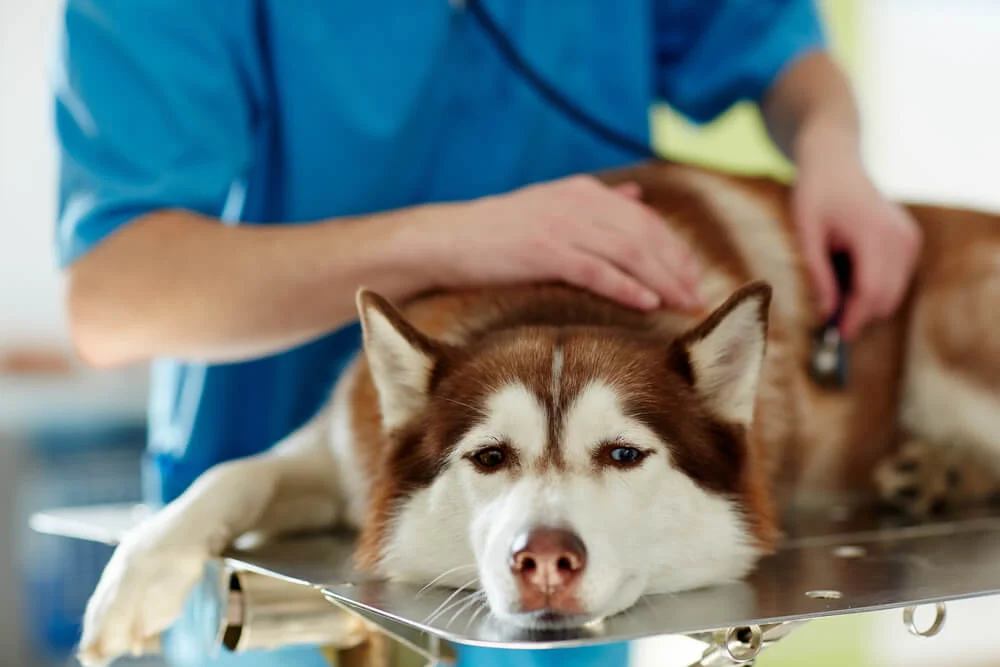Is your dog straining to poop, passing runny poops, or are you noticing fresh blood or mucus in their stools? If so, it may mean your dog has colitis. This article will cover everything you need to know about colitis in dogs and what can be done to help.
What is colitis?
Colitis is a descriptive term for inflammation of the colon or large intestine. It is not a definitive diagnosis, as colitis itself can be caused by many different triggers. Colitis can be subcategorized as acute colitis (symptoms lasting less than two weeks) and chronic colitis (lasting greater than two weeks). Understanding the duration of your pet’s symptoms can help your veterinarian get to the root of the problem faster.
What causes colitis?

Acute colitis is usually associated with stressful events or dietary indiscretions.
Colitis can come about for many different reasons. These include:
- Infections
- Dietary indiscretion
- Inflammatory bowel disorders (IBD)
- Hormonal or metabolic disorders
- Toxicities
- Stress
- Cancer
Acute colitis is usually associated with stressful events (termed “stress colitis“) or dietary indiscretions (because every dog loves to munch on questionable rotting things on a walk!). Typically, but not always, if your dog’s signs persist for longer, there maybe be something more serious going on, such as parasite infections, or IBD.
What are the symptoms of colitis in dogs?

Tummy pain and lethargy ma not be the main symptoms of colitis in dogs, but are often accompanying them.
Colitis in dogs typically presents with some or all of the following symptoms:
- Unformed or watery poop
- Straining to poop
- Pain when pooping
- Small amounts of fresh blood or mucus on the poop
- Increased frequency of defecation
- Flatulence
You may also notice:
- Changes in appetite or drinking habits
- Weight loss
- Tummy pain
- Lethargy
How is colitis treated?
How colitis is treated depends on several factors. In acute cases where your dog is otherwise well, your veterinarian will likely recommend supportive care alone. This usually consists of feeding a high-quality, easily digestible diet alongside some probiotic treatment. If your dog feels sick, they will receive an anti-nausea medication. Your vet may provide some electrolytes for your pup’s water bowl. However, suppose your pooch is doing poorly with their colitis. In that case, your veterinarian may suggest admitting them to the hospital so they can be placed on a drip and given medications into the vein to help them feel better quicker.
In more chronic cases, your veterinarian will likely recommend some investigations initially, such as blood testing, poo sampling, and even, in some patients, a tummy ultrasound or camera studies for gut biopsies. This can help achieve a definitive diagnosis and a more targeted treatment approach.
Treatment of proven inflammatory bowel disease (which requires biopsies) usually resolves around dietary manipulation initially. Often your veterinarian will recommend feeding a high quality limited ingredient diet. You may need to try several different protein sources to find one that works for your pup. Each diet trial should be fed exclusively (no treats or snacks!) for a minimum of 4-6 weeks to be sure if it will work or not. Probiotics may also be recommended alongside worming medication.
In the longer term, some dogs may need anti-inflammatory or immunosuppressive medication and a special diet if they have severe inflammatory bowel disease. There is also some emerging research into using “fecal matter transplant” or poo transplants to help treat gut disease! Cancers of the gut, hormonal disorders, infections, and toxicities have more specific treatment protocols that your veterinarian will advise you on.
Colitis should not be treated with antibiotics unless a definitive diagnosis of invasive bacterial infection has been made. This is because antibiotics can actually make the problem worse rather than better by upsetting the good bacteria living in your dog’s digestive tract!
How to prevent colitis?

Here are some key steps in reducing the likelihood of your pup developing colitis:
- Work with your veterinarian on a comprehensive preventative healthcare protocol for vaccinations, flea, and worming treatment.
- Avoid your pup eating things they shouldn’t. Teaching leave commands can help with this. Prolific scavengers may need a basket muzzle on walks.
- Feed a high-quality, complete & balanced diet and avoid giving unhealthy treats or snacks (we know it can be tricky ignoring those puppy-dog eyes!)
What about colitis in puppies?
Puppies deserve a special mention regarding colitis as they are more at risk of becoming very ill quickly compared to adult dogs. Therefore, if your puppy has an upset tummy, you should always speak to your veterinarian for advice early on.
Final Thoughts
In most cases, acute colitis is short-lived and rarely causes significant concern for pup parents. If your dog has signs of colitis and is unwell, has symptoms persisting for more than three days, or is in an at-risk category (very young, elderly, or has a concurrent medical disease), then it is advisable to speak to your veterinarian for advice right away.
FAQs:
What triggers colitis in dogs?
Many things can trigger colitis in dogs, from stress to dietary changes to infections or immune system disorders. Your veterinarian can work with you to get to the bottom of your dog’s colitis trigger.
How do I know if my dog has colitis?
Typically, dogs with colitis will have poop that becomes softer or runny, they may strain to pass poop, and there may be mucus or small amounts of fresh blood in the feces. They may also have increased flatulence. Other signs that can sometimes accompany colitis include weight loss, vomiting, or tummy pain.
Is colitis in dogs fatal?
It is rare for colitis to prove fatal in dogs, but it is not an impossibility. Acute colitis is more likely to present as severe disease in young or elderly patients or those with concurrent medical disorders. Chronic colitis can be a manifestation of severe disease. If your dog has colitis signs, then consult your veterinarian for advice.
Sources
Defarges. A (2022) Colitis in Small Animals. MSD Veterinary Manuals. Available at https://www.msdvetmanual.com/digestive-system/diseases-of-the-stomach-and-intestines-in-small-animals/colitis-in-small-animals#:~:text=Colitis%20is%20common%20in%20dogs,antibiotics%20or%20anti%2Dinflammatory%20drugs. [Accessed 6th October 2022]
Makielski. K, Cullen. J, O’Connor. A and Jergens. A (2017) Narrative review of therapies for chronic enteropathies in dogs and cats. Journal of Veterinary Internal Medicine. 33 11-22 DOI: 10.1111/jvim.15345



